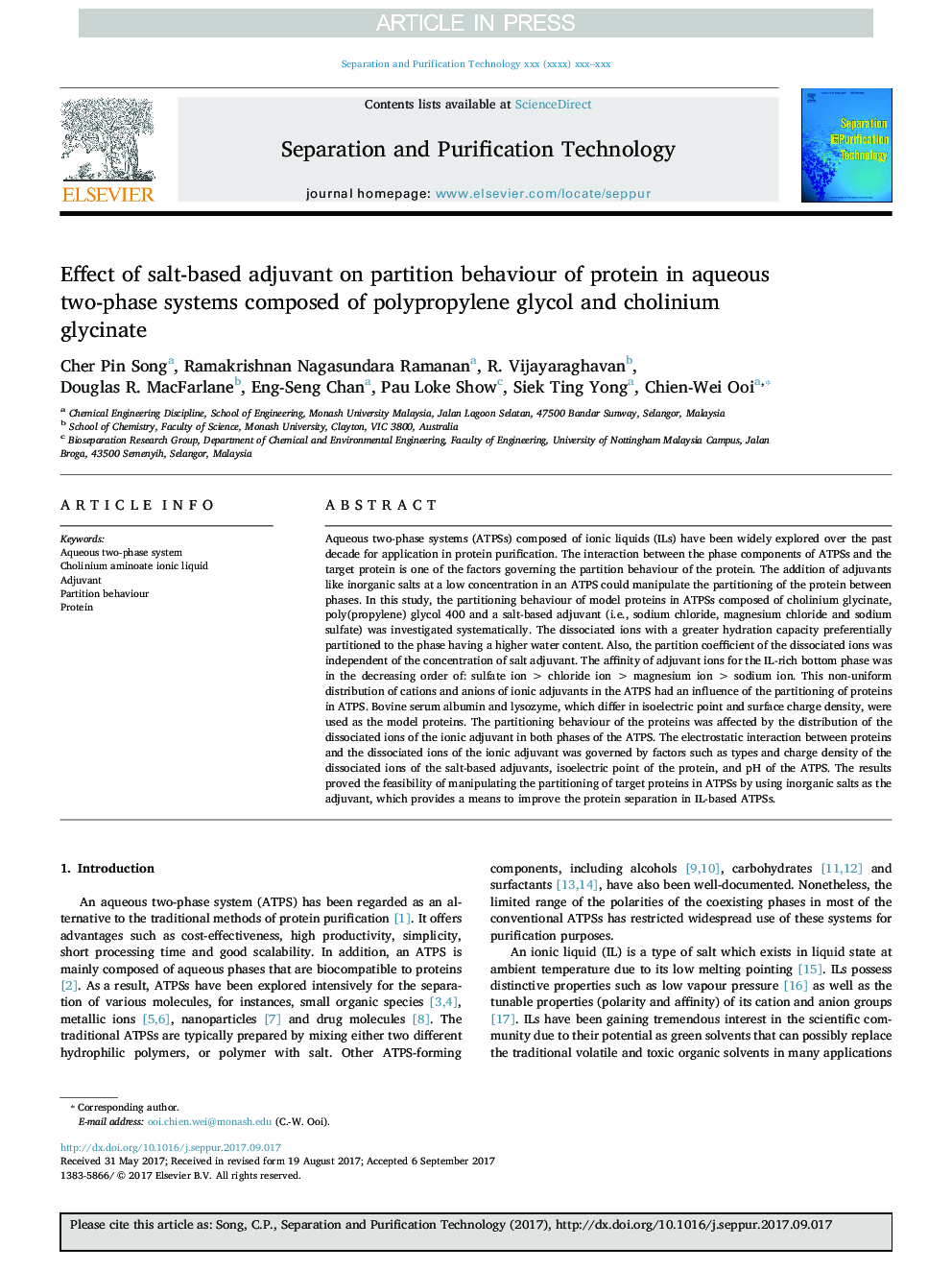| کد مقاله | کد نشریه | سال انتشار | مقاله انگلیسی | نسخه تمام متن |
|---|---|---|---|---|
| 7043990 | 1456924 | 2018 | 6 صفحه PDF | دانلود رایگان |
عنوان انگلیسی مقاله ISI
Effect of salt-based adjuvant on partition behaviour of protein in aqueous two-phase systems composed of polypropylene glycol and cholinium glycinate
ترجمه فارسی عنوان
تأثیر کمپلکس مبتنی بر نمک بر رفتار پارتیشن پروتئین در سیستم های دو فاز آبی شامل پلی پروپیلن گلیکول و گلیسینات کولینیم
دانلود مقاله + سفارش ترجمه
دانلود مقاله ISI انگلیسی
رایگان برای ایرانیان
موضوعات مرتبط
مهندسی و علوم پایه
مهندسی شیمی
تصفیه و جداسازی
چکیده انگلیسی
Aqueous two-phase systems (ATPSs) composed of ionic liquids (ILs) have been widely explored over the past decade for application in protein purification. The interaction between the phase components of ATPSs and the target protein is one of the factors governing the partition behaviour of the protein. The addition of adjuvants like inorganic salts at a low concentration in an ATPS could manipulate the partitioning of the protein between phases. In this study, the partitioning behaviour of model proteins in ATPSs composed of cholinium glycinate, poly(propylene) glycol 400 and a salt-based adjuvant (i.e., sodium chloride, magnesium chloride and sodium sulfate) was investigated systematically. The dissociated ions with a greater hydration capacity preferentially partitioned to the phase having a higher water content. Also, the partition coefficient of the dissociated ions was independent of the concentration of salt adjuvant. The affinity of adjuvant ions for the IL-rich bottom phase was in the decreasing order of: sulfate ion > chloride ion > magnesium ion > sodium ion. This non-uniform distribution of cations and anions of ionic adjuvants in the ATPS had an influence of the partitioning of proteins in ATPS. Bovine serum albumin and lysozyme, which differ in isoelectric point and surface charge density, were used as the model proteins. The partitioning behaviour of the proteins was affected by the distribution of the dissociated ions of the ionic adjuvant in both phases of the ATPS. The electrostatic interaction between proteins and the dissociated ions of the ionic adjuvant was governed by factors such as types and charge density of the dissociated ions of the salt-based adjuvants, isoelectric point of the protein, and pH of the ATPS. The results proved the feasibility of manipulating the partitioning of target proteins in ATPSs by using inorganic salts as the adjuvant, which provides a means to improve the protein separation in IL-based ATPSs.
ناشر
Database: Elsevier - ScienceDirect (ساینس دایرکت)
Journal: Separation and Purification Technology - Volume 196, 8 May 2018, Pages 281-286
Journal: Separation and Purification Technology - Volume 196, 8 May 2018, Pages 281-286
نویسندگان
Cher Pin Song, Ramakrishnan Nagasundara Ramanan, R. Vijayaraghavan, Douglas R. MacFarlane, Eng-Seng Chan, Pau Loke Show, Siek Ting Yong, Chien-Wei Ooi,
